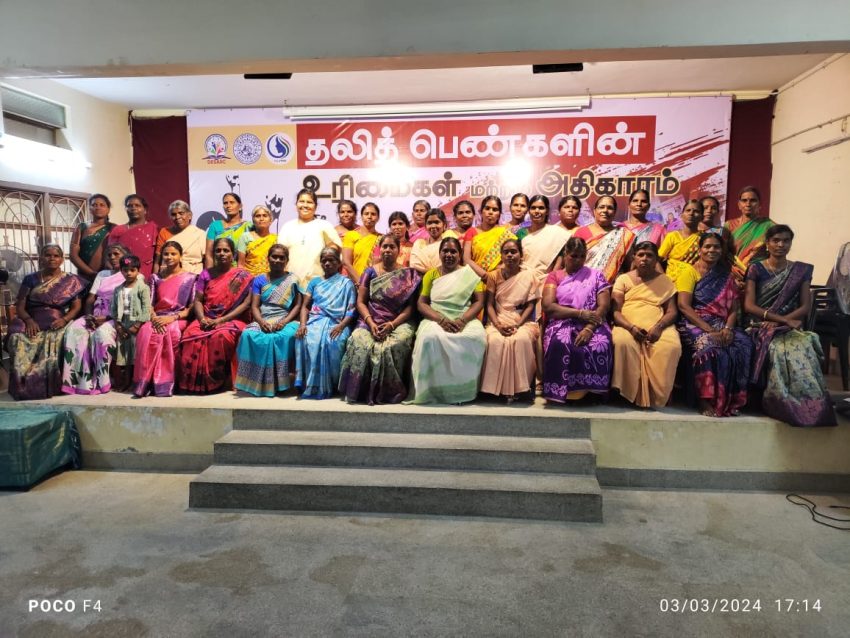Silent struggle of women and women religious in the Catholic Church

Robancy A Helen, India
An article was published on February 5, 2025, under the title Why Do Catholic Clergy Treat Women as Servants? in Matters India, a leading Catholic online news portal. The author is Mr. M. L. Satyan from Coimbatore, Tamil Nadu. The news piece discusses the Conference of Catholic Bishops in India (CCBI) plenary assembly, which was held from January 28 – February 4, 2025, in Bhubaneswar, Odisha.
The author of the author questioned the role of women, especially Catholic nuns, in the assembly. It is a centuries-old practice in the Catholic Church that women take secondary roles. When I read the news, I was not surprised, as I have been in similar situations over the past 18 years as a religious sister. Why then am I reflecting on this again? It is usual for women in the Catholic Church to be accustomed to this treatment and tolerate being treated as servants. Not all men in the Church treat women as servants, as Pope Francis does! Being the Head of the Catholic Church, his actions are exemplary.
Recently, I was asked to take classes for the Tamil Nadu Jesuit scholastics who are in their first- and second-year theology courses at Arul Kadal, the Regional Theologate Centre, Chennai, on Dalit Feminism. Before proceeding to discuss Dalit women, I spoke on Feminism, women empowerment, Dalit women, Dalit Christian women, and Dalit women religious.
I had three hours to share my views and experiences of Dalit Christian women. During the question-and-answer session, a scholastic asked me for my opinion on the women’s priesthood in the Catholic Church. I smiled at him and said that women need to be at the decision-making levels of the Church, but the reality on the ground is that women are not respected. They are treated as second-class citizens. When they are treated equally with due respect, we can move ahead.
I also mentioned that I was glad about the decisions of Pope Francis to appoint Sr. Simona Brambilla as the first female prefect and Sr. Raffaella Petrini to head the Governatorate in the Vatican.
Women are asked to clean the Church, the nuns are asked to decorate the altars, and to prepare children for the Holy Sacraments, among other tasks. What we first want is equal treatment and respect, as Jesus did, as we see in the Old Testament, where the Book of Exodus starts with the story of women. God used women in salvation history. Starting with Eve, the first woman, there were many others, and Mother Mary is the culmination of that history.
One day, I was talking to a priest about the Bible and the role of Mother Mary in the Catholic Church. He explained how he defends the importance of Mother Mary to those who criticize her. A pastor was criticizing the Catholics and Mother Mary.
The priest explained to him how God used Mother Mary to fulfil salvation history, and the pastor responded, saying that Mother Mary was like the shell of an egg: once the egg is boiled, we throw the shell away.
The priest then said that he wanted to meet the pastor’s mother at home. The pastor was perplexed, but the priest insisted on meeting her. He half-heartedly agreed to take the priest home and asked him for the reason. The priest replied, “I want to see your mother and check if she is in the dustbin of your house, as you said the shells of the eggs are thrown after use.” The pastor became furious, his face turning red. The priest continued, “If you can’t bear to hear that your mother is treated as garbage after giving birth to you, the same is true for us Catholics. We venerate Mother Mary as our mother.”
Women in the Catholic Church are also treated as the shell of the egg. The hierarchy wants women to decorate the altar, but they are not allowed to serve at the altar. They can educate people in the Catholic faith, but they cannot preach at Mass (although there are women who preach at retreats). Women will always be assistants to the executive secretaries in the bishop’s councils. They have to prepare the reports, but the men, who are the secretaries, present the reports. Their names are not even acknowledged. Women and religious work hard to make the meetings of the bishops’ conferences a success, but they are not allowed to make decisions.
When women share articles or news regarding women’s empowerment on WhatsApp or Facebook, we don’t receive replies. In October 2024, His Eminence Malcom Cardinal Ranjith, the Archbishop of Colombo, mandated that girls were not permitted to serve as altar servers in parishes within the Archdiocese of Colombo.
He justified his decision by stating that “serving as an altar server can be a pathway to the priesthood and should therefore be a position reserved for boys.” He added, “It should always be young boys because this is one of the main sources of vocations to the priesthood in Sri Lanka, and it will affect the number of candidates entering the seminaries. Since females are not allowed to be ordained priests, we have made this decision.”
When the above message was shared in a WhatsApp group, a priest commented that “discussing girls or boys as altar servers is equivalent to what the Chinese Church was discussing about the color of vestments for liturgy while people were dying of hunger. There are much more pressing concerns in the Sri Lankan Church to be addressed, especially for people struggling to meet their fundamental right to a dignified life. This may not be the time to highlight such issues.”
Vocations to the priesthood and religious life are gifts from God, and they should be fostered equally. Serving at the altar and taking on leadership roles should depend on a person’s gifts, grace, commitment, and capacity.
The issues of women need to be addressed with greater importance. “The feminine genius is necessary in all expressions of the life of the Church and society,” says Pope Francis. Men and the male-chauvinistic society need to be sensitized.
It is painful to note that we are in 2025, which marks the Jubilee year with the theme of Pilgrims of Hope. But our churches are closing their doors to women in leadership roles, making women lose hope.
The general public admits that women are the best administrators, and they are used to handling all the backstage work. On the dais, women are kept to fill the space, or they are not invited as key speakers. Women have to remain voiceless as they are economically weak. The Catholic Bishops’ Conference of India did not have a cloakroom for religious sisters until 2019, and the executive secretary for the CBCI Women’s Council got a room in the same year.
It is a pity that even the women’s commissions of the bishops’ conferences are headed by men. When it comes to leading Church institutions, women become weaker, but when it comes to administering domestic chores in the Church, they are regarded as the best administrators.
We need to create a just and inclusive world for women in the Catholic Church in India. As Pope Francis is changing the traditional pattern of the Church, bishops and priests must take extraordinary care to appoint women to leadership positions and end the gender inequality that has been prevalent in the Catholic Church in India for years.



Leave a Reply